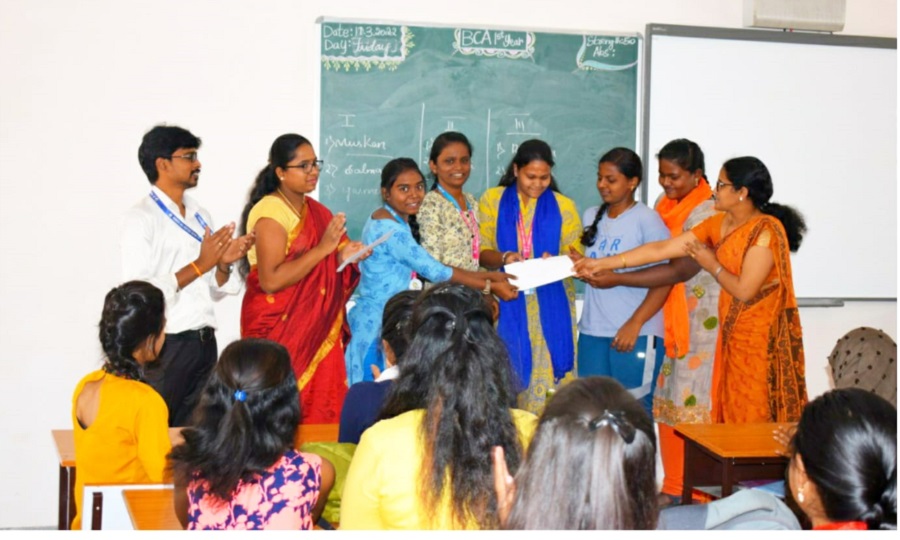B.C.A
July 25, 2022 2023-06-09 10:15B.C.A
B.C.A
-
Profile
-
Vision & Mission
-
OPPORTUNITIES & CAREERS
-
OBJECTIVES AND OUTCOMES
-
TEACHING AND LEARNING METHODS
-
Syllabus
The BCA degree program has been structured to ensure that the outcomes which follow are met by all graduates at the time of their graduation. All graduates will possess:
- An ability to apply knowledge of computing and mathematics to software design and computing problems
- An ability to analyze a problem, and identify and define the computing requirements appropriate to its solution
- An ability to design, implement, and evaluate a computer-based system, process, component, or program to meet desired needs
- An ability to function effectively on teams to accomplish a common goal
- An understanding of professional, ethical, legal, security and social issues and responsibilities
- An ability to communicate effectively with a range of audiences both in an oral and written form.
Assessment
- Each course will be assessed for 100% weight out of which 60% weight is for Continuous Assessment and 40% weight for Semester End Examination.
- The 60% weight under continuous assessment is distributed as 20% weight for Internal test 1 normally conducted during 5th week of the semester, 15 % weight for the NEP(NATIONAL EDUCATION POLICY) normally conducted during the 10th week of the semester and 25% weight is for Assignment/Project Based Learning/Simulation Based Problem Solving/ Surveying and Data Analysis/
- Open Book Examination or any such activity or combination of such activities which enhances original thinking of students. The activity to be undertaken by the students will be specified in the course document based on the nature of the course and instructor’s judgment. Students are required to submit the material for assessment in the form and format as specified by the
- Instructor within the prescribed date, failing which will call for punitive action against late submissions as per the notifications of the University/School/Department.
- The dates for conducting Internal Test-1, CBT and dates of submission of assignments will be announced in the academic calendar.
- If an academic department would like to administer additional tests for absentees or to improve the performance of the students, they can do so at the department level under the supervision of the Chairman of the department with approvals from the Dean of the School.
- Each test will be conducted for 50 marks for a duration of 2 hours and the marks awarded be scaled down to 20% weight
CBT will be conducted for 30 marks for a duration of 1 hour and the marks awarded be scaled down to 15% weight - For audit courses there will not be any internal examination, a final examination for 50 marks will be conducted for a period of 2 hours.
- There are few courses which will have theory and laboratory content. For the laboratory content 20% weight can be assigned and the remaining 80% weight is for theory
- The Semester End Examination will be conducted for 100 marks for a duration of 3 hours and marks awarded will be scaled down to 40% weight
- The question papers set for tests and examination will adhere outcome-based education requirement, however, the pattern of question paper to be set need to be decided-particulars like number of questions, marks for each questions, choices if any etc.
- The student performance in the practical courses (laboratory, workshops, and any such) will be assessed with a 60% weight for continuous evaluation based on each practical exercise performed and Semester End Test and other 40% weight for Semester End Examination.
- Seminars, Internships and Project work will be assessed at different stages against department/Dean approved rubrics
- For any group work such as project work in UG Program, number of students per group and the assessment of the members of the group will be separately notified. The components may include persentation by the students, demonstration, report submission and viva voce.
Such of the students who would like to earn a few credits not exceeding the credits specified in the program document for online courses/ MOOCs need to submit course completion certificate with the grades awarded. The number of credits to be awarded for such courses will be decided by the department chairman and his/her faculty team based on effort involved in completion of the course. In case the online course provider is not assessing the student, department will make necessary arrangement for assessment of the course undergone and award of credits.
Student will have an opportunity to access their evaluated answer scripts of tests and assignments and can report any discrepancies to the concerned course instructor/Chairman or Dean. - A student is required to score a minimum of 40% in continuous evaluation as well as in the semester end examination and overall there should be 40% for a pass in each course registered. Students will be awarded letter grades as per university policy and the transcripts issued will have SGPA ( Semester Grade Point Average) and CGPA (Cumulative Grade Point Average)
- Certain courses may require a pass in the final examination and such courses will be notified by the concerned Department Chairman/Dean
About the Department:
Vision
To emerge as power house of Information Technology and Allied areas developing competent computer professionals to meet the dynamic needs of disruptive technologies.
Mission
To impart technical knowledge through innovative teaching, research and consultancy.
- Provides state-of-the-art facilities and internationally recognized faculty.
- To adapt to the dynamic needs of industries through curriculum update. Promotes partnerships with industry and community.
- To produce competent graduates with professional ethics and life skills.
BCA graduate could aim for after successful completion of the program are:
- Software Developer
- Mobile App Developer
- Data Scientist
- Big Data Analyst
- Software Testing Specialist
- Web Designer
- Game Programmer
- System Administrator
- Database Administrator
- Network Specialist
- Network Security Expert
- Animation Expert
- PEO1: Our graduates will be successful as Computer Application Developers, Algorithm Developers, Computer Programmers.
- PEO2: Our graduates will have successful professional careers in industry, government, academia and military as innovative engineers.
- PEO3: Our graduates will continue to learn and advance their careers through activities such as participation in professional organizations, attainment of professional certification and seeking higher education.
- PEO4: Our graduates will be active members ready to serve the society locally and internationally.
PROGRAMME SPECIFIC OUTCOMES (PSOs):
Upon completion of this programme, students will be able to
- PSO 1. Ability to apply the fundamental principles of mathematics and Computer Applications in finding feasible solutions.
- PSO 2. Ability to develop software systems / products as per design specifications.
- PSO 3. Ability to identify, select and use modern software tools and distributed computer architectures to conduct investigation on data and algorithms to arrive at valid conclusions or to identify and mitigate vulnerabilities.
- PSO 4. Ability to adapt as members of diverse teams by exhibiting excellent communication skills and ethical values and engage in lifelong learning in the field of Computer Applications.
PROGRAMME OUTCOMES (POs):
After undergoing this programme, a student will have:
- PO1: The programme acts as a foundation degree and helps to develop critical, analytical and problem solving skills at first level.
- PO2: An ability to apply knowledge of computing and mathematics appropriate to the discipline.
- PO3: An ability to identify, analyze, research literature, formulate complex problems involving computing.
- PO4:Ability to design, implement and evaluate a computational system / solution to customer requirements.
- PO5: An ability to use appropriate techniques, skills and tools necessary for computing practice.
- PO6: An ability to function effectively in teams to accomplish shared computing design, evaluation or implementation goals and lead team in multidisciplinary realm.
- PO7: Ability to make effective written and oral presentations and communication that facilitate to work in collaboration.
- PO8: Apply project management and software engineering practices to the launch of new programs, initiatives, products, services and events relative to the needs of stakeholders.
- PO9: Ability to pursue independent study and demonstrate the capabilities for lifelong learning and professional development.
Faculty members can adopt various teaching – learning methods to effectively teach the students. Following are some of the teaching and learning methods that are being used by faculty members in the University
- Face to face lectures using audio-visuals
- Project Based Learning
- Workshops-group discussions, debates, presentations
- Demonstrations
- Laboratory-work/Field work/Workshop
- Industry visit
- Seminars
- Group Exercises
- Project Work
- Project Exhibitions
- Technical Events



